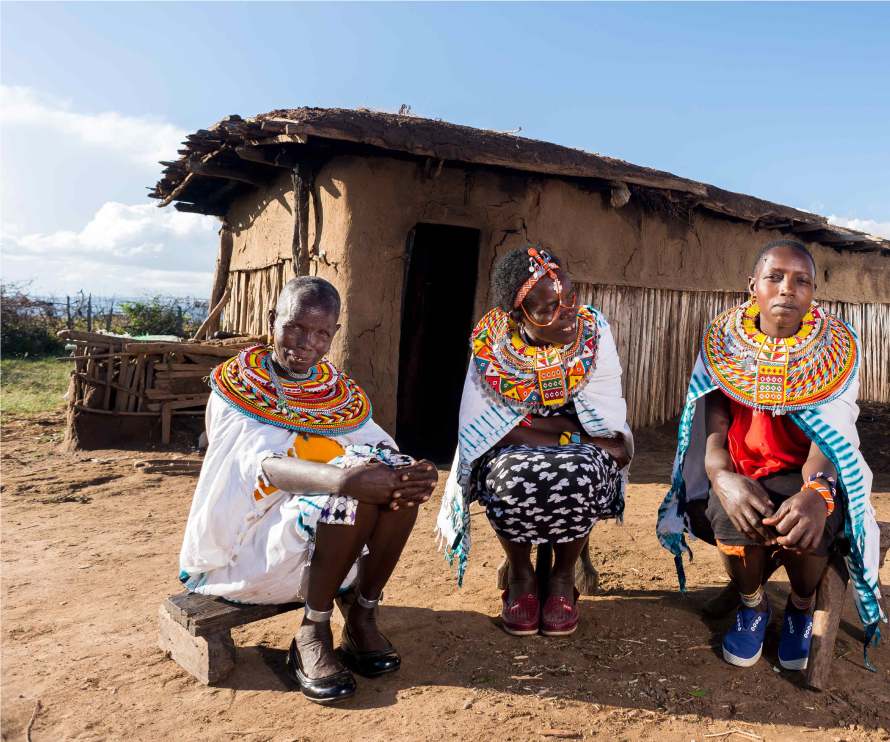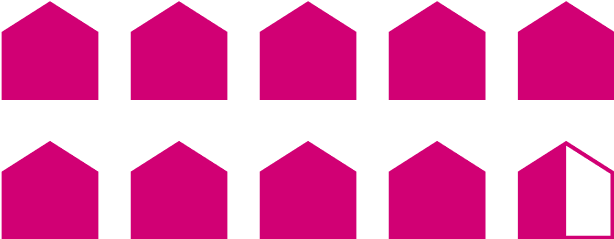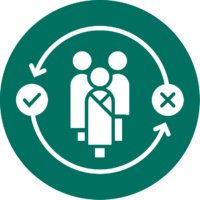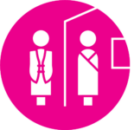
Breaking the Poverty Trap Long Term
We are striving for a world where extreme poverty no longer exists — where everyone can realize their potential and better their lives.
Watch the Full LectureWhat idea is bigger than the idea that the poorest of the poor have enough talent to be self-sufficient? That if you give them a push, they’ll stay up?
- Abhijit Banerjee, Nobel Lecture
What Is the Plan?
We partner with governments, multilateral institutions, NGOs, and civil society at the global, regional, and national levels to scale our Graduation approach, which helps people in extreme poverty earn sustainable, long-term livelihoods.
Our immediate focus is on Africa and Asia because these areas experience high levels of extreme poverty and possess immense potential for impact.
How We Work
We’ll leverage BRAC’s experience, insights, and expertise to support our core efforts:
Our ExpertiseStrengthening Government Capacity
We partner with governments to integrate our approach into their existing programs and better empower people in extreme poverty.
Adapting to Local Contexts
Working alongside local governments and communities, we customize poverty alleviation programs to address the unique challenges within specific contexts.
Investing in Learning & Innovation
We study the most effective ways to adapt and scale Graduation. This information directly informs our program and policy recommendations and helps us improve our methods.
Influencing Policies & Programs
We advocate for more adaptive, inclusive, and comprehensive policies and programs — aligning our efforts across the global, regional, and national levels for the greatest impact.
1972
BRAC is founded in Bangladesh
Sir Fazle Abed founds BRAC as a small relief organization. BRAC spends the next three decades gradually scaling education, healthcare, microfinance, and social enterprise programs across Bangladesh.
2002
The Graduation Approach is Born
BRAC pioneers the Graduation approach and launches its Bangladesh Ultra-Poor Graduation (UPG) program after realizing its existing poverty reduction programs were not adequately serving the people who were poorest.
2009
BRAC Expands Internationally
BRAC starts its first international UPG program in Afghanistan to support increased implementation of Graduation programs through BRAC International.
2013
First Technical Assistance Grants Awarded to BRAC
BRAC receives its first grants to provide technical assistance and advocacy support on the integration of BRAC’s Graduation approach into existing programs.
2016
BRAC UPGI is Founded
BRAC officially establishes BRAC Ultra-Poor Graduation Initiative (UPGI) to provide advisory services and technical support to government and NGO partners for Graduation programs.
2019
BRAC UPGI Makes Strides Globally
BRAC UPGI has worked with government partners in the Philippines, Kenya, Rwanda, Lesotho, Guinea, Zambia, India, and Pakistan, adapting the approach for each local context and effectively integrating into existing government programming and policies.
2020
BRAC Awarded Status as an Audacious Project
BRAC UPGI is named a 2020 Audacious Project and launches a strategy to scale in eight select countries within Africa and Asia.
2021
BRAC UPGI Expands to New Countries
BRAC UPGI signs new contracts with governments in the Philippines, India, and Tunisia to expand the uptake of the Graduation approach.
Subscribe to Our Newsletter
Join Our Team
View Job Opportunities at BRAC UPGISign Up for the BRAC UPGI Newsletter
Sign up for our monthly newsletter to receive news on scaling the Graduation approach and evidence-backed poverty alleviation efforts.
Our Impact
Since BRAC pioneered the Graduation approach in 2002, it has proven to be adaptable, scalable, and far-reaching, providing the “big push” people need to escape the poverty trap long term. Graduation programs have been developed in approximately 50 countries, with BRAC having implemented or provided technical assistance in 16 of those countries.

95% of participants “graduated” in Bangladesh.
To date, BRAC UPG in Bangladesh has reached more than 2.1 million households and graduated 95% of participants.

93% of BRAC UPG participants in Bangladesh have seen a continued increase in income, savings, and consumption seven years after starting the program.
This includes: a 37% increase in earnings, a 9% increase in consumption, a ninefold increase in savings rate, and a twofold increase in household assets and access to land for livelihoods.

Graduation can break the poverty trap.
An 11-year study confirms the existence of the poverty traps, finding Graduation can provide the “big push” households need to accumulate assets and savings and begin a path out of extreme poverty.

Social and psychological empowerment is key to Graduation’s impact.
Research on a government-led program in Niger finds that Graduation’s psychosocial interventions led to improved mental health, social cohesion, women’s empowerment, and program cost-effectiveness.
Adapting Graduation for Different Contexts & Communities
Extreme poverty does not exist on its own. It is deeply tied to the other large-scale global challenges. That’s why we adapt our approach to effect positive change across a variety of contexts, for different marginalized communities, addressing multiple Sustainable Development Goals (SDGs).
Gender Inequality
Women’s Economic Empowerment
Climate Resilience
Adapting for Urbanization
Youth Empowerment
Food Security
Reducing Gender Inequality (SDG 5)
Women are disproportionately affected by extreme poverty. They have less access to and control over resources, less access to healthcare and education, and are more likely to perform unpaid or underpaid care work.
Because they face the greatest vulnerabilities and are more likely to invest back into their families, the Graduation approach prioritizes women in extreme poverty. We work alongside them to build resilience, secure sustainable employment, and carve a path out of extreme poverty for themselves and their households.
- Empowering Women through the Graduation Approach
BRAC’s Graduation approach aims to empower women as agents of change within their households and their broader communities.
Supporting Economic Empowerment (SDG 10)
People in extreme poverty — particularly women — are often trapped in low-wage or irregular work that keeps them from earning enough, saving, or investing in the future. They frequently face social and financial barriers to receiving loans, opening bank accounts, and integrating into local markets.
The Graduation approach connects participants to markets, promotes financial inclusion, and provides resources and training so they can build long-term livelihoods.
- Livelihoods Promotion in the Ultra-Poor Graduation Approach
Through our tailored market-driven livelihood interventions, participants gain the tools to earn sustainable incomes and lift their households out of extreme poverty.
Building Climate Resilience (SDG 13)
Extreme poverty and climate change are inextricably linked. As climate change worsens, it compounds systemic inequalities and exacerbates poverty, food insecurity, and social injustice.
As part of a collective effort to combat the impacts of climate change, BRAC commits to applying a climate resilience lens to future development activities, including Graduation programs in climate-vulnerable contexts.
- Building Climate Resilience through the Graduation Approach
By supporting more diversified incomes, food security, financial services education, and coaching on natural resource management, Graduation helps participants become more economically resilient in the face of climate and other major shocks.
Adapting for Urbanization (SDG 11)
Migrants to industrial areas often accept the risks and poor living conditions of city life because it is their only way to access the economic opportunities available in urban centers.
Although originally developed for rural communities, the Graduation approach has been adapted to urban contexts to address the growing challenges and needs of urban populations.
- Adapting the Graduation Approach for the Urban Context
To effectively tailor our Graduation approach to urban contexts, we conducted rigorous assessments of the vulnerabilities, needs, and capacities of people living in urban poverty.
Reducing Youth Unemployment (SDG 8)
The global youth labor force will increase significantly by 2030. With many working youth living in poverty, some in extreme poverty, there is a need to empower the next generation with income-generating skills and assets.
Barriers to youth empowerment leave young people, especially adolescent girls, more vulnerable to poverty, exploitation, early age pregnancy, and gender-based violence. While access to education is expanding, quality of learning is lagging behind and the new generations face limited job prospects. Social and economic inclusion programs can connect young people with economic opportunities and set them on a path out of poverty.
- Youth Economic and Social Inclusion
BRAC’s youth empowerment program takes a multifaceted approach to this complex challenge, applying key elements from Graduation and providing youth with education, economic empowerment, and social support.
Promoting Food Security (SDG 2)
Achieving zero hunger requires holistic approaches that recognize and address the deeply intertwined realities of food insecurity and extreme poverty.
To reach both the goal of zero hunger and the eradication of extreme poverty by 2030, the international community must back evidence-based programs which enable households to build resilient livelihoods so that they can access and afford nutritious food now and in the long term.
- Graduation and Food Security
Graduation promotes food security holistically so that participating households can experience long-term improvements in their household nutritional status.
Subscribe to Our Newsletter
Join Our Team
View Job Opportunities at BRAC UPGISign Up for the BRAC UPGI Newsletter
Sign up for our monthly newsletter to receive news on scaling the Graduation approach and evidence-backed poverty alleviation efforts.
